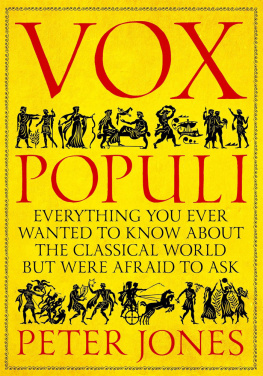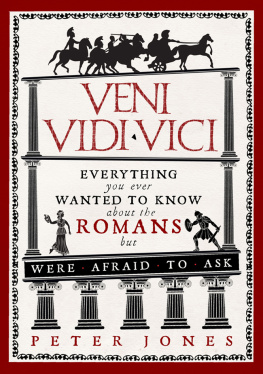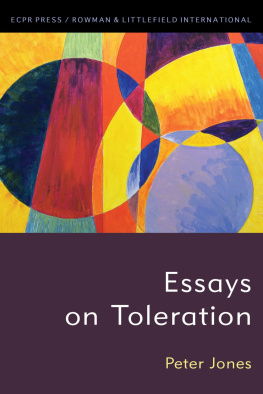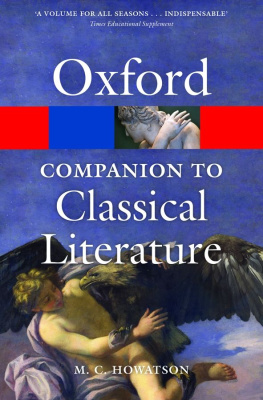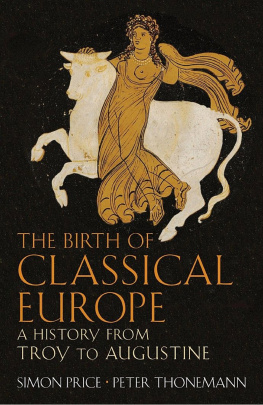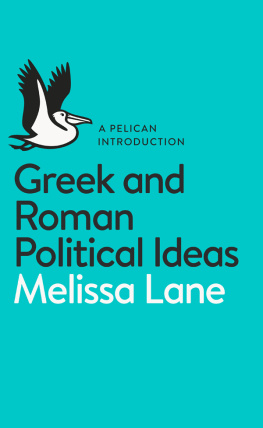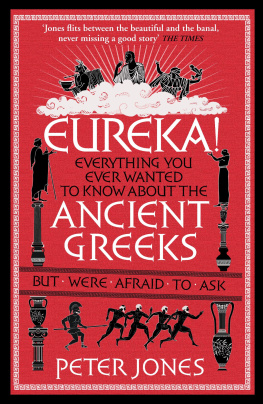Contents
Guide
VOX
POPULI
Also by Peter Jones
Vote for Caesar
Learn Latin: The Book of the Daily Telegraph QED series
Veni Vidi Vici
Eureka!
Quid Pro Quo
Memento Mori

First published in hardback in Great Britain in 2019 by Atlantic Books, an imprint of Atlantic Books Ltd.
Portions of this book first appeared in An Intelligent Persons Guide to the Classics, which was published in Great Britain in 1999 by Gerald Duckworth & Co. Ltd.
Copyright Peter Jones, 1999, 2019
The moral right of Peter Jones to be identified as the author of this work has been asserted by him in accordance with the Copyright, Designs and Patents Act of 1988. All rights reserved. No part of this publication may be reproduced, stored in a retrieval system, or transmitted in any form or by any means, electronic, mechanical, photocopying, recording, or otherwise, without the prior permission of both the copyright owner and the above publisher of this book.
Every effort has been made to trace or contact all copyright holders. The publishers will be pleased to make good any omissions or rectify any mistakes brought to their attention at the earliest opportunity.
1 2 3 4 5 6 7 8 9
A CIP catalogue record for this book is available from the British Library.
Hardback ISBN: 978-1-78649-895-3
E-book ISBN: 978-1-78649-893-9
Paperback ISBN: 978-1-78649-894-6
Designed by Carrdesignstudio.com
Map artwork by Jeff Edwards
Printed in Great Britain
Atlantic Books
An Imprint of Atlantic Books Ltd
Ormond House
2627 Boswell Street
London
WC1N 3JZ
www.atlantic-books.co.uk
CONTENTS
PREFACE
T his is the only book ever published whose author may well agree with the critic who says he should have written a different one. But I probably could not have written it.
The first edition of this book was entitled An Intelligent Persons Guide to Classics (Duckworth 1999). , with some additions and adaptations, remain from it. Its aim remains the same: to explain how the literature and physical remains of the ancient world have been preserved; to provide a broad outline history of the period traditionally covered by the term Classics (roughly 700 BCAD 500); and to eludicate certain aspects of Greek and Roman life and thought that I hope will strike the reader as interesting. I am especially grateful to Jeannie Cohen for her close scrutiny of a number of the new chapters.
Those who value their families will know what I owe to Lindsay, our children and grandchildren.
Peter Jones
July 2019
Newcastle upon Tyne
Note: If you would like to see access to the languages, history and culture of the ancient Greek and Roman worlds extended across all our schools, please visit the website of the inspirational charity Classics for All: https://classicsforall.org.uk/


TIMELINE
ROMANS |
1000 BC | Continuous occupation of hill-town Rome |
753 BC | Rome founded: Romulus Romes first king |
750 BC | Etruscan city-states dominant in northern and western Italy |
509 BC | Rape of Lucretia: Romes last king Tarquinius expelled: foundation of the republic First trade treaty with Carthage (of, eventually, four) |
280275 BC | Romans drive Greek Pyrrhus out of Italy |
270 BC | Rome master of Italy |
264241 BC | First (Punic) War against Carthage: Sicily and Sardinia made provinces |
C. 240 BC | Livius Andronicus translates the Odyssey into Latin |
218204 BC | Second Punic War: Spain and North Africa made provinces |
211148 BC | Romes four wars vs Macedon; Macedon and Greece made a province. Rome culturally captured by Greeks |
C. 180 BC | Greek-based comedies of Plautus and Terence |
149146 BC | Third Punic War: Carthage razed to the ground North Africa and Spain become provinces |
133 BC | Tiberius Gracchus land reforms |
129 BC | Pergamum becomes Roman province |
11181 BC | Marius and Sulla bring civil war to Rome |
100 BCAD 100 | Romes classical period: Lucretius (d. c. 55 BC), Catullus (d. c. 54 BC), Cicero (d. 43 BC), Virgil (d. 19 BC), Horace (d. 8 BC), Ovid (d. AD 17), Livy (d. c. AD 17), Martial (d. AD 104), Tacitus (d. AD 120), Juvenal (d. AD 120) |
6663 BC | Pompey brings Asia Minor into Roman orbit |
5950 BC | Caesar makes Gaul a province |
5655 BC | Caesar invades Britain |
53 BC | Crassus killed in Parthia |
4946 BC | Caesar defeats Pompey in civil war |
44 BC | Caesar assassinated |
39 BC | First public library in Rome |
31 BC | Octavian defeats Marc Antony in civil war |
27 BC | Octavian becomes Emperor Augustus |
27 BCAD 1453 | Roman Empire |
C. AD 40 | Remmius Palaemon, grammarian |
AD 43 | Claudius brings Britain into the Empire |
AD 68 | Death of Nero |
AD 79 | Vesuvius erupts |
C. AD 85 | Martial publishes poems in codex form |
AD 117 | Trajan emperor extends empire into Armenia |
AD 284 | Diocletian creates an Emperor for the Eastern Empire |
AD 312337 | Constantine Emperor: Christianity becomes the dominant state religion |
AD 325 | Byzantium becomes Constantinople, capital of the Eastern Empire |
AD 365 | Hun-driven Germanic invasion into the Empire |
|

